




 |
   |
 |
 |
Vanessa Paradis (1992, 37.39) ***/T½ |
|
| Natural High I'm Waiting for the Man Silver and Gold Be My Baby Lonely Rainbows Sunday Mondays Your Love Has Got a Handle on My Mind The Future Song |
Paradis Just as Long as You Are There Gotta Have it |
|
Current availability:
Mellotron used:
Vanessa Paradis is probably better known as an actress than as a singer, particularly in her native France. Remembered best elsewhere for her teenage hit Joe Le Taxi (1987), Vanessa Paradis was her third album, effectively in collaboration with Lenny Kravitz, with whom she was apparently in a relationship at the time. It's far better than I expected, I have to say, although at times it sounds more like a Kravitz album with a girly singer (Paradis was all of twenty at the time of its release), although, when you consider that he wrote most of it, produced it and played on every track, that's hardly surprising. To my ears, it begins to drag after a few tracks, becoming more 'commercial' as it goes along, although maybe I was just becoming fatigued at the sound; it's still an awful lot better than you'd ever expect of an album by a young French actress (sorry, but you know what I mean...). Saying that, both the near-instrumental Paradis and the frankly bizarre Gotta Have It that closes the record, are well off the mainstream, providing a much-needed antidote to some of the blander material surrounding them.
Other interesting tracks include the Velvet Underground's Waiting For The Man, which, when heard being sung by a woman, accentuates the sexual ambivalence implied by the title and the album's two ballads. Both have Mellotronic input, Kravitz playing flutes all the way through Silver And Gold and more of the same, uncredited, on Lonely Rainbows, probably Kravitz again, but could possibly be his regular keyboard player, Henry Hirsch, who plays on several tracks here.
See: Lenny Kravitz
 |
Paragone (1994, 44.00) **/TT½Once Again TwiceA Room of One's Own Fad Dance Under the Evening Sky New Day I) Early Rain II) Silver Lining III) Curious Grey IV) The Parting Twilight Moon Tide |
Current availability:
Mellotron used:
Paragone were an early '90s Milwaukee-based progressive outfit, who, going by their sole, eponymous release, were seriously in thrall to '80s so-called 'neo-prog' (we never called it that at the time, for what it's worth). I really tried to like this album, but almost every track (bar opener Once Again Twice, which starts gently) follows the same dreary path: big, bombastic opening, leading into some ridiculously over-busy drumming and not in a good, Museo Rosenbach kind of way (perish the thought), followed by several minutes of dull, unadventurous, repetitive instrumental work (I suppose we should be grateful they didn't have a singer), of which the cheesy, major-key Under The Evening Sky is probably the worst example. Have you never heard of key modulations, chaps? Chord sequences even just slightly off the well-trodden path? Even the remotest hint of dissonance? Deeply depressing. Is there a best track? Yes, actually: although closer Moon Tide takes the same path as everything else here, it does it better, with more Mellotron.
Mark Walczak plays keys, including real Mellotron, which he overuses on every track (albeit only two parts of the four-part New Day), whacking huge slabs of highly unadventurous chordal strings amongst some horrible digital keys, adding flutes to part one of New Day, Early Rain, for good measure. Is any of his use worth hearing? Perhaps unsurprisingly, Moon Tide is also the best Mellotron track, featuring a very pleasant flute solo (somewhat spoilt by more of those cheeso synths) and big, lush strings. Is Paragone worth hearing? In a word, no. Sorry, guys. Paragone underwent a reshuffle not long after, becoming Nightales, although the two bands shared several members. Their one album, 1996's The Voyage, isn't the most exciting thing you'll ever hear, but it beats this nonsense.
See: Nightales
 |
Shamblejam (1975, 38.57) ***/T½ |
|
| Denomination Blues Green Psalm Shine On Me Changes Don't Let The Morning Come Corners Of My Life Speaker's Corner Morning Sky |
My Man on Love Light of the World Long as I Can See You |
|
Current availability:
Mellotron used:
In the pre-CCM days of the '70s, Parchment were a 'Jesus rock' outfit, 1975's Shamblejam being (to my knowledge) the third of their four albums. Despite the 'message', it's a very listenable folk/psych effort, a little dated for the time, but then, Christians tend to be pretty conservative, so we shouldn't be too surprised, should we? Highlights? Green Psalm, Changes, with its silver band backing and closer Long As I Can See You, although some of the more upbeat material gets a little wearing.
Despite detailed instrumental credits, including guests, there's not a single mention of any keyboards, let alone the Mellotron that appears on three tracks, with a flute line and a single, very loud choir chord at the end of opener Denomination Blues and the flutes on their cover of Judee Sill's My Man On Love and Long As I Can See You. Not a Mellotron classic, exactly, but a surprisingly decent album from those pre-evangelist days.
 |
To Mock a Killingbird (1993, 49.55) **½/½ |
|
| Anesthesia Did I Hear You Say...? Make Believe (Jesus Freak) Powerless Junk Mail Love to Turn You on Nobody Listens Do You Know How to Rock |
Letter to Myself Torn and Tied This Means War Love Sick Kid |
|
Current availability:
Mellotron used:
After an independent release, Pariah released their sole major-label album in 1993, To Mock a Killingbird (ho ho), by which time the metal scene had suffered a major upheaval with the arrival of grunge and the total collapse of the '80s 'hair' style (hurrah!). Not that it's a full-on hair-metal album; they'd clearly been listening to the mighty King's X, amongst others, but there are too many pointers on the record to the previous decade to ignore, frankly. I mean, Alice in Chains managed to make the transition, not to mention Pantera, even if the latter uselessly tried to deny for years that their first three albums were by the same band... Anyway, this album has its moments, mostly the quiet ones (notably brief acoustic guitar piece Love), but you can see why Geffen wasted their money on them; derivative, few decent songs and a seeming inability to decide what they actually wanted to sound like.
Jeffrey C.J. Vanston plays Mellotron, if only just, with a few seconds of strings in the dying seconds of closer Sick Kid. All in all, then, unless you're really into that late '80s/early '90s hard rock thing, you do not need this album.
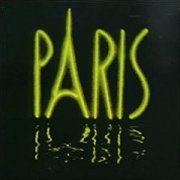 |
Paris (1976, 40.54) ***/½ |
|
| Black Book Religion Starcage Beautiful Youth Nazarene Narrow Gate (La Porte Etroite) Solitaire Breathless |
Rock of Ages Red Rain |
|
Current availability:
Mellotron used:
After American Bob Welch (here credited as Robert) left Fleetwood Mac in disgust at their infighting, he formed a power trio, Paris, with ex-Jethro Tull bassman Glenn Cornick (here doubling on keys) and ex-Nazz (Todd Rundgren's first serious band) drummer Thom Mooney. I think it's safe to say that their debut, Paris, rips Led Zeppelin something rotten, Black Book, Religion and Beautiful Youth being total Zeppalikes, Welch's vocals on most tracks cutting Robert Plant just a little too close for comfort. Saying that, it's not a bad album, just rather more derivative than it might and should have been. It does feature tricks that Zeppelin never used, such as the sequencer lines on Starcage and, when Welch gets funky, he sounds nothing like Jimmy Page whatsoever.
This is actually one of those albums that I put on with no expectation of Mellotron use whatsoever and, after a false alarm re. the string synth on Beautiful Youth, I thought I'd got away with it. But no. Come the first track on side two (the longest and probably the album's best track), Narrow Gate (La Porte Etroite), after a few more Zep-esque minutes, suddenly Cornick's Mellotron strings appear, bolstered with a whiny synth note at the beginning of each chord, making me wonder for a moment if it was more of that string synth. Has to be Mellotron, though, lifting the track very nicely indeed, I have to say.
See: Bob Welch | Fleetwood Mac | Jethro Tull
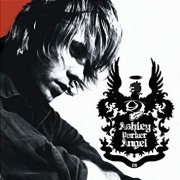 |
Soundtrack to Your Life (2006, 46.57) *½/½ |
|
| Let U Go I'm Better Soundtrack to Your Life Feel So Alive Crazy Beautiful Who Cares Shades of Blue Beautiful Lie |
Perfect Now Where Did You Go Along the Way Apology |
|
Current availability:
Chamberlin used:
Ashley Parker Angel (born Ashley Ward Parker, Angel being his stepfather's name) was a member of boyband O-Town. Er, who? His sole album (I refuse to tempt fate by saying 'to date'), 2006's Soundtrack to Your Life (no, Ashley. No. It isn't) kicks off in a pop/punk-lite vein, but, to absolutely no-one's surprise, fails to sustain even this limited energy level, rapidly sinking into the expected slough of despond, a.k.a. typical millennial boyband pop crud. Any particular lowpoints? Most of it, frankly, although Who Cares? gets extra brownie un-points for outrageously ripping Pink Floyd's Us And Them for an audience who've never even heard of it.
Patrick Warren is credited with keyboards on two tracks, one of which, Along The Way, features what are clearly Chamberlin cellos and strings, albeit only here and there. Big fucking fail.
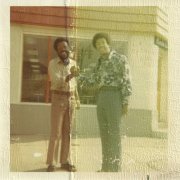 |
The New Breed (2016, 36.14) ***/TExecutive LifePara Ha Tay Here Comes Ezra Visions Jrifted How Fun it is to Year Whip Get Dressed Cliche |
Current availability:
Mellotron used:
Jeff Parker is an LA-based jazz guitarist, working in the experimental and improvisational fields, alongside playing in post-rock troupe Tortoise since the '90s. 2016's The New Breed is his fifth solo album proper, elements of hip-hop and electronica, amongst other genres, apparent in its largely instrumental, angular approach, possibly at its best on Here Comes Ezra.
Parker and Josh Johnson play (presumably) producer/bassist Paul Bryan's M4000 Mellotron, with a repeating woodwind line on opener Executive Life (this is what's known as an 'educated guess'), vibes on Visions and chordal flutes (alongside Johnson's real one?) on Jrifted. Is it anywhere else? I know they had twenty-four sounds to play with, but, given that Parker's also credited with 'loops' and 'sampler', not to mention the album's spacious mix, you'd have thought it might be a little more obvious.
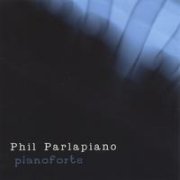 |
Pianoforte (2004, 39.30) ***½/TTT |
|
| The Last Goodbye Fanzine No One's Home Thanks for the Insight Shape of Water Hold Me Ma Every Little Thing The Night That You Left |
Some Days Are Like That Menthol Cigarette |
|
Current availability:
Mellotron used:
New York-born, L.A.-raised, Phil Parlapiano has had a stellar, if largely supporting career, playing with the likes of (deep breath) John Prine, Joan Baez, Alannah Myles, Rod Stewart, Dave Koz, Grant Lee Buffalo and Elvis Costello, even appearing (as an accordionist) in Titanic. His solo debut (?), 2004's Pianoforte, consists largely of Americana-informed singer-songwriter material, a powerpop influence making itself known in places, at its best on opener The Last Goodbye, No One's Home and Shape Of Water, amongst others.
Parlapiano plays (his own?) M400, with strings and flutes on The Last Goodbye, a strident string line on Fanzine, pitchbent strings on Thanks For The Insight, intertwining flutes on Every Little Thing, cello and string lines on Some Days Are Like That and, although there's nothing on closer Menthol Cigarette itself, a short gap precedes a Mellotron string and cello coda to the album. Not groundbreaking, then, but a solid set of memorable songs, several of them sweetened by judicious Mellotron use.
See: Devil Doll | Gift Horse | Kim Hill | Jupiter Affect | Dave Koz | Mason South | Alannah Myles | Cara Tower | The Uninvited | Leslie West | Jason Wilber | Victoria Williams |
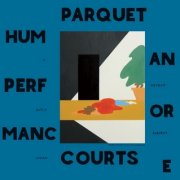 |
Human Performance (2016, 42.45) **/T |
|
| Dust Human Performance Outside I Was Just Here Paraphrased Captive of the Sun Steady on My Mind One Man No City |
Berlin Got Blurry Keep it Even Two Dead Cops Pathos Prairie It's Gonna Happen |
|
Current availability:
Mellotron used:
NYC's Parquet Courts bear more comparison with The Velvet Underground than most of that outfit's stylistic descendents, as if (gasp!) they might actually have gone to source and listened to the band itself. I'm not saying this is a good thing, simply a thing. Actually, going by their fifth album, 2016's Human Performance, it's a very bad thing, its plinky guitars and frenetic, Noo Yawk vocal delivery very quickly becoming deeply wearing. Material like, well, everything actually, ground this listener down in pretty short order.
Mellotron? Austin Brown: "We used it on the song Captive Of The Sun. It's a tape loop. Whenever you play the note it plays like a sample of the keyboard or the flute or whatever that is on the tape and it loops. On Captive Of The Sun you can hear the loop coming back around. It's got, like, a warp in it where it sounds almost like someone's slowing the record down or something. If you hold the note down for too long it has a warp in it, I thought that was kinda cool." Where to start? It doesn't contain loops, so how could you hear it come round? Did you have a real one in the studio, or are you referring to the loop point in a sample? Well, whatever it is turns up on a couple of tracks, with a flute solo on the title track and very wobbly choirs (so I presume it IS real) on Captive Of The Sun. Believe me, the possibility of a real Mellotron on this record is not to be taken as a recommendation.
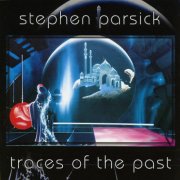 |
 |
Traces of the Past Redux (1998/2007, 74.59) ***½/TTT |
|
| Submerging Close Beneath the Surface Cosmic Jellyfish Green Depth Hydra Ashram Totem Poles The Keeper of Time |
Quicksilver Sea Traces of the Past |
||
Current availability:
Mellotrons used:
Stephen Parsick was all of twenty when he released his first homemade EM recording in 1992, '98's Traces of the Past being his third, before he began a full-blown release frenzy in the 2000s. It's a sparse electronic album, only partially comparable to The Tangs, at its best on the punchy Ashram and the exceedingly atmospheric title track that closes the record. Parsick reworked it in 2007 as Traces of the Past Redux, experts agreeing that, by editing some tracks and adding other's he's improved the overall feel.
Parsick and Klaus Hoffmann-Hoock (RIP) are credited with Mellotron on the original release, but only Parsick on the ...Redux version, although I've no idea why. Anyway, the original issue has a full gear list, informing us that the duo used both an M400 and a Novatron MkV, obviously Klaus' Mellotron arsenal at the time. We get distant choirs on Close Beneath The Surface, a distant, high flute line and heavily-reverbed strings and cellos on Green Depth, an upfront flute line on new piece Hydra, strings on another new piece, The Keeper Of Time and, finally, full-on strings on the title track, although the choirs sound generic. 'Original EM' seems to be a non-sequitur, sadly, but parts of this album are at least heading in the right direction. Worth hearing.
See: Cosmic Hoffmann
 |
Yearling (2011, 42.07) ***½/T½ |
|
| Burning Up the Sky Hazy Dream When You Love Somebody Unemotional Seven Years Ago Time is Running Out Kids Hanging Out Happy We Agree |
I Was Only Banking on the Sun |
|
Current availability:
Mellotron/Chamberlin used:
Parson Red Heads released their second album, the ten-track Yearling, in 2011, allowing it to go out of print soon after, only to be reissued in expanded form the following year. Although the reissue strikes me as rather overlong, the quality of the band's gentle Americana is undeniable, highlights including Hazy Dream, Unemotional, Time Is Running Out and the sparse I Was Only. Tracks I'd have left off? Lengthy reissue closer Here It Comes Again is probably an acquired taste, but there's nothing too awful here, although this is probably, in some ways, better approached as two separate albums.
Brian Whelan plays Mellotron on two tracks, with chordal flutes on When You Love Somebody and I Was Only, while Chris Stamey (Sneakers) adds sparse Chamberlin strings to Banking On The Sun, to excellent effect. Americana fans previously unaware of Parson Red Heads need to get hold of this, although the tape-replay use is limited enough to not make it worthwhile for that alone.
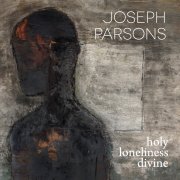 |
Holy Loneliness Divine (2022, 44.58) ***/½ |
|
| Dreaming a Universe Passengers Invisible My My Caroline Bookshop Mary Dreams We Dare Daring to Fall Forever Yours |
Full Moon Tide Thankful |
|
Current availability:
Mellotron used:
According to Joseph Parsons' Bandcamp page, his fifteenth solo album, 2022's Holy Loneliness Divine "...is the latest and final record from the Joseph Parsons Band (JPB)...", although the cover credits merely Parsons himself. Stylistically, it sits somewhere in between early '80s new wave pop, Americana and powerpop, like a younger Tom Petty, perhaps. Highlights? The bluesy Passengers, Bookshop Mary and the Pettyesque Daring To Fall, perhaps. Suffice to say, if slightly-off-the-mainstream American pop/rock's your bag, you won't go too far wrong here.
Mellotron? It's hard to say. Bassist Freddi Lubitz is credited with production on opener Dreaming A Universe at a studio in Köln, but the only studio of the several at which the album was recorded that seems to have a Mellotron is America's Kawari Sound. Was Lubitz even there? Assuming he was, he may or may not play it on the track, with vague, background strings that could be just about anything. Is this a Mellotronic recommendation? It is not.
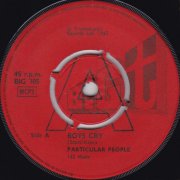 |
7" (1967) ***½/TTT Boys Cry What's the Matter With Juliet? |
Current availability:
Mellotron used:
One-off studio duo Particular People were Ken "Lewis" Hawker and Rod Clark, both compatriots of John Carter (The Flower Pot Men, a million others) and his crowd. As a result, it won't come as any great surprise to hear that both sides of their lone 7", Boys Cry b/w What's The Matter With Juliet?, are excellent pieces of cod-psychedelia, easily comparable to many better-known efforts. For those not in the know, Boys Cry was a no. 8 hit in 1964 for Eden Kane, a.k.a. Richard Sarstedt, brother of Peter and the lesser-known Clive.
Dirty Mellotron brass from an unknown musician (Hawker/Lewis?) opens the 'A', with filthy great slabs of strings later on, in highly pleasing fashion, although the flip is probably the better song, an unfairly obscure number, rerecorded as b-sides for a couple of Transatlantic outfits.
See: John Carter
Andy Partridge (UK) see: |
 |
Passport (Germany) see: |
 |
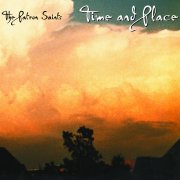 |
Time & Place (2005, 52.26) ***½/T½ |
|
| Don't Turn Away You're Dangerous She Loves to Be in Love Good Friday What in the World Fly Away In the Mourning You Have No Heart |
Home When You Met Your Maker Time and Place |
|
Current availability:
Mellotron used:
Shamefully, before researching The Patron Saints, the name meant nothing to me. It should? They originally coalesced in 1966, releasing one of those 'legendary lost classic'-type albums in '69, Fohhoh Bohob. So far, so obscure. Versions of the band continued to play throughout the '70s and later, eventually getting it together to record a new album in the early 2000s. 2005's Time & Place is really rather good, as it happens, its contents written between 1970 and the recording period; they even get deceased original member Jon Tuttle on there by adding their contributions to his early '70s demo of Home. Highlights include the massed acoustics of opener Don't Turn Away, the gorgeous 12-string Byrdsian jangle of She Loves To Be In Love, Fly Away and the lengthy closing title track, but, frankly, it's all good.
Keeper of the flame Eric Bergman plays Mellotron, with a chordal string part on What In The World and an impressive pitchbend opening and closing In The Mourning, plus chordal choirs. Unsurprisingly, I haven't heard the band's original album, but, my interest now piqued, I intend to repair that omission as soon as. In the meantime, buy this album.
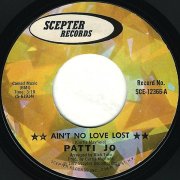 |
7" (1972) ***/TT Ain't No Love Lost Stay Away From Me |
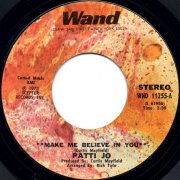 |
7" (1973) ***/TT Make Me Believe in You Do You Love Me Baby |
Current availability:
Mellotrons used:
Patti Jo (Demps) was a Curtis Mayfield protégé, who only released two singles in the early '70s before fading into obscurity. Her first release, Ain't No Love Lost b/w Stay Away From Me, is pretty standard soul/funk fare, although her follow-up, Make Me Believe In You (later recorded by Mayfield himself) is a big improvement, a real floor-filler, although I'm afraid I haven't heard the flip.
Mellotron strings (from an unknown musician) all over Ain't No Love Lost, played with considerable dexterity, including one of the fastest runs I've heard attempted on the instrument, which almost comes off, although, strangely, we get real strings on the flip. More of those string section-replacement strings on Make Me Believe In You, along with a nifty flute part, making both 'A' sides worth hearing on the Mellotron front. Assuming the information's correct, it seems Patti Jo died in 2007, aged sixty.
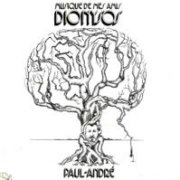 |
Musique de Mes Amis Dionysos (1978, 28.17) ***/TTSors de Ta TêteVancouver Bouguet de Roses Le Son des Neiges Un Air de Fête Bye Bye Retour L'Âge d'Or II |
Current availability:
Mellotron used:
Musique de Mes Amis Dionysos has led me a merry dance for not a little while, chiefly due to the confusion surrounding the credited artist. I've had it down as Paul-André Thibert for years, most online sources (and its CD reissue) list it as being by his ex-band, Dionysos, most of whom play on it, while it actually turns out to be credited to simply 'Paul-André'. This remarkably short album is generously describable as 'diverse', consisting mostly of mainstream rock, late '70s style, typified by opener Sors De Ta Tête, the sub-Steely Dan-isms of Vancouver and the sax-driven rock'n'roll of Bye Bye, less obvious contributions including their dual-guitar instrumental tribute to Duane Allman, Bouguet De Roses, 12-string ballad Retour and closer L'Âge D'Or II, apparently a re-recording of old Dionysos fan fave L'Âge D'Or.
Mellotron is provided by none other than our old friend Michel le François, although many of the album's string sounds are clearly provided by a string synth. Anyway, we get a strangely Crimson-esque string interlude halfway through the otherwise irritatingly jaunty Vancouver and major string parts running through the acoustic Retour and L'Âge D'Or II, plus choirs on the last-named; not the heaviest use ever, but nice to hear. So; do you bother? If the album were a little more consistent, I could give you an unqualified 'yes', but with so little genuinely good material, I'd be hard-pushed to be that positive. In fairness, the easiest way to source a copy is the 2-on-1 CD pairing it with Dionysos' eponymous 1976 release, which may well be more worth the effort.
See: Michel le François
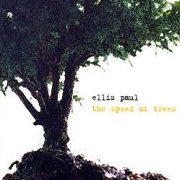 |
The Speed of Trees (2002, 52.34) ***/T½ |
|
| Maria's Beautiful Mess Give in, Give Up Eighteen If You Break Down The Ballad of Chris McCandless Sweet Mistakes Words Roll Away Bed |
Breaking Through the Radio When We Begin God's Promise The Speed of Trees |
|
Current availability:
Chamberlin used:
Ellis Paul (not to be confused with Paul Ellis) is a Maine-based singer-songwriter who, although his songs have been used on TV and in films, is rather better than that (dis)honour might suggest. 2002's The Speed of Trees was his eighth studio album, highlights including sparse opener Maria's Beautiful Mess, the powerpoppy Give In, Give Up and the countryish Sweet Mistakes, although, sad to say, too many tracks fall into the 'formulaic' trap, at least musically, to raise its overall rating.
Paul Bryan plays Chamberlin, with a sympathetic string part on Eighteen, background strings on Sweet Mistakes and strings and flutes on When We Begin. Although I haven't heard any more of Paul's work, I suspect he's a 'compilation artist': going by The Speed of Trees, he manages a handful of good tracks per album that could be compiled into a classic. But then, isn't that still several steps above most artists?
See: Paul Bryan
Pavlov's Dog (US) see: |
 |
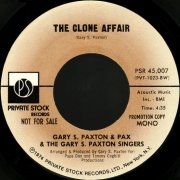 |
7" (1974) ***/TT The Clone Affair Teardrops, Pennies and Git-Tar Picks |
Current availability:
Mellotron used:
Gary Sanford Paxton (1939-2016) was a semi-peripheral industry figure, who produced various artists in the '60s, before concentrating on his own career, initially country as Rusty Dean and several other noms de plume, then country gospel under his own name. 1974's The Clone Affair sounds like a parody of something, but I'm afraid my knowledge of mid-'70s American mainstream entertainment is a little limited, so I have no idea of what (can anyone enlighten me?). It's a largely spoken word effort, featuring a mildly amusing lyric concerning cloning oneself; slight, if mildly diverting.
Someone (very possibly Paxton himself) played Mellotron on the 'A', with some wonderful pitchbent strings on the intro and chords later on. Sadly, though, the Mellotron-free flip, Teardrops, Pennies And Git-Tar Picks is little more than a forgettable novelty country number.
See: Rusty Dean | Happy Lovin' Time
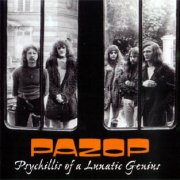 |
Psychillis of a Lunatic Genius (1996, recorded 1972-73, 61.10) ***½/T |
|
| Le la Loo Loo le la Harlequin of Love Crying for Disaster's Hand What is the Further Purpose Swaying Fire Mirela Freedom Dance Lovelight |
Bami, Lychee, Si Harlequin of Love [Second Version] Can it Be Sin And the Hermit Will Be the Master M.M.M. In the Army (Devil Likes Smoke) Airport Formalities and Taking Off Stewardess and Breakfast It's the End |
|
Current availability:
Mellotron used:
Pazop are another in the seemingly unending stream of bands whose work was never released at the time, sometimes deservedly, although that in no way applies in this case. Psychillis of a Lunatic Genius (no, I don't know either) is an accomplished, jazzy, slightly Zappa-esque, guitarless progressive release, consisting of the unreleased 1972 album of the same name, plus more unreleased recordings ('the second album') from the following year. The resulting collection is slightly overlong, but I can't imagine what you'd drop to make it a more listenable length; after all, it's only an hour... Highlights include Swaying Fire and Bami, Lychee, Si, but (Zappa humour aside) there's little here to upset the more adventurous prog fan.
François Louis "Frank" Wuyts plays keys; while there's no Mellotron on the '72 album, it appears on a couple of the '73 tracks, with string stabs on Bami, Lychee, Si and a major part several minutes into Can It Be Sin, although not really enough to garner the album more than one T. Like a good few others that spring to mind (not least the wonderful Autumn album), Psychillis of a Lunatic Genius is a worthy rescuee from obscurity, showcasing a previously-unheard side of Belgian prog, a million miles away from Machiavel's later symphonics. Worthwhile, though not really for the Mellotron.